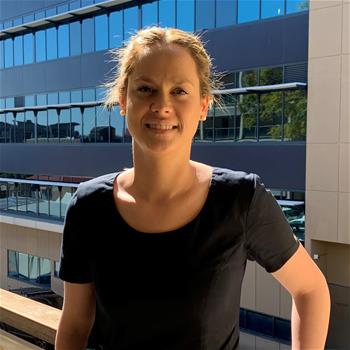Prostate cancer is the most commonly diagnosed cancer in Australian men, with more than 24,000 men diagnosed each year according to the Prostate Cancer Foundation of Australia.

It also has one of the highest survival rates of all cancers, with 95 per cent of men diagnosed likely to survive five years or more. Risk factors that may increase the chance of developing prostate cancer include age and family history.
Marking Prostate Cancer Awareness Month in September, we sat down with St Andrew’s Prostate Cancer Specialist Nurse, Kitty to find out more about her role and what motivates her.
Tell us about your role
My role is about helping to fill gaps in care for patients with prostate cancer who come to us for surgery, and to be there to help guide and reassure them through their treatment and recovery. I work between our doctors, allied health professionals including men’s health physiotherapist, and ward nurses to build a team around our patients and their families. We work collaboratively to provide continuity of care, where our patients see the same faces regularly and get to know us well.
For many patients, we meet prior to surgery to provide pre-operative education and to talk about what to expect after surgery and during recovery. We also meet some patients for the first time on the ward the day after their surgery. I think the most important part of my role is to be there as someone patients can
meet and connect with, especially before surgery. It helps to give them
some reassurance ahead of what they are about to embark upon.
What happens after surgery?
I see patients following surgery and ensure they are well educated on what to expect at home and about caring for the catheter they will be discharged with. Patients then return to have their catheter removed 7-14 days later. At this point, I have the opportunity to discuss changes to urinary and sexual function post-surgery. The prospect of these changes can be really scary for men coming in for a radical prostatectomy. However, the support and treatment options available to men are fantastic and makes managing these complications much easier. We are fortunate to see so many patients having a very positive experience throughout their recovery which is a real testament to the wonderful urologists at St Andrew’s.
After the removal of the catheter, we normally see patients in our outpatient clinic for about six weeks. In the clinic, the patients will see myself and our Men’s Health Physio, Emily, at the same time. It can be a long recovery, especially managing bladder control and sexual function, and questions can come up anytime. Patients can get in touch with us at any stage in their recovery even if that’s 12 months down the track.
Why did you choose to become a Prostate Cancer Nurse?
I always wanted to work in cancer care and was really drawn to that area of nursing because of my own experiences. But when I graduated as a Registered Nurse and was selected for the St Andrew’s Graduate Nurse Program, I was placed on the urology ward and I absolutely loved it there. I loved the fast-paced ward environment and never ended up moving into cancer care. When the Prostate Cancer Specialist Nurse opportunity came along it was perfect because it combined my two passions of urology and oncology.
What motivates you in your role?
My personal experiences with cancer gave me a very clear insight into the toll cancer can take on the patient, their loved ones and entire support network. Realising that I can make a big difference for others while they are being treated for cancer inspires me.
Also, the patients themselves. They keep me motivated. No two patients are the same which encourages us to continually evolve the care and service we provide to ensure we are meeting each individual’s needs as best we can. It’s the different people that you meet and it’s a humbling experience to be a part of someone’s cancer experience.
According to the Prostate Cancer Foundation Australia, men have a 1 in 5 chance of being diagnosed with prostate cancer by age 85. What’s your message to men?
The most important message is to talk to your doctor about your risks and keep up with your prostate cancer screening, and all health screening, as directed by your doctor. The earlier it’s detected the better the outcomes.
For many men, prostate cancer screening involves a simple blood test to monitor PSA (Prostate-Specific Antigen) levels. A rectal exam may follow, but for most it’s as simple as a blood test. I really encourage everyone to be accountable for keeping up with regular screening and health checks as directed by their doctor.